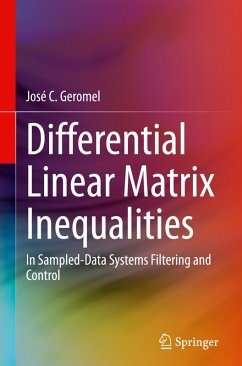This book is entirely devoted to sampled-data control systems analysis and design from a new point of view, which has at its core a mathematical tool named Differential Linear Matrix Inequality - DLMI, a natural generalization of Linear Matrix Inequality - LMI, that had an important and deep impact on systems and control theory almost thirty years ago. It lasts until now. It is shown that the DLMI is well adapted to deal with the important class of sampled-data control systems in both theoretical and numerical contexts. All design conditions are expressed by convex programming problems, including when robustness against parameter uncertainty is assessed and imposed through state feedback control.
Special attention is given to filter, dynamic output feedback and model predictive control design, as well as nonlinear systems of Lur'e class and Markov jump linear systems.
The subject is treated with mathematical rigor, at the same time, trying to keep the reading agreeable and fruitful for colleagues and students. To this respect, the book contains together with the theoretical developments, many solved illustrative examples and the formulation of some open problems that could be faced and hopefully solved by interested readers.
Special attention is given to filter, dynamic output feedback and model predictive control design, as well as nonlinear systems of Lur'e class and Markov jump linear systems.
The subject is treated with mathematical rigor, at the same time, trying to keep the reading agreeable and fruitful for colleagues and students. To this respect, the book contains together with the theoretical developments, many solved illustrative examples and the formulation of some open problems that could be faced and hopefully solved by interested readers.
"The subject of the book is well expressed by its title. The book is very organized. Each chapter begins by an introductory section and ends by a section of bibliography notes. The book offers both mathematical rigor and attractiveness for the reader ... ." (Henri Bourlès, zbMATH 1529.93001, 2024)








